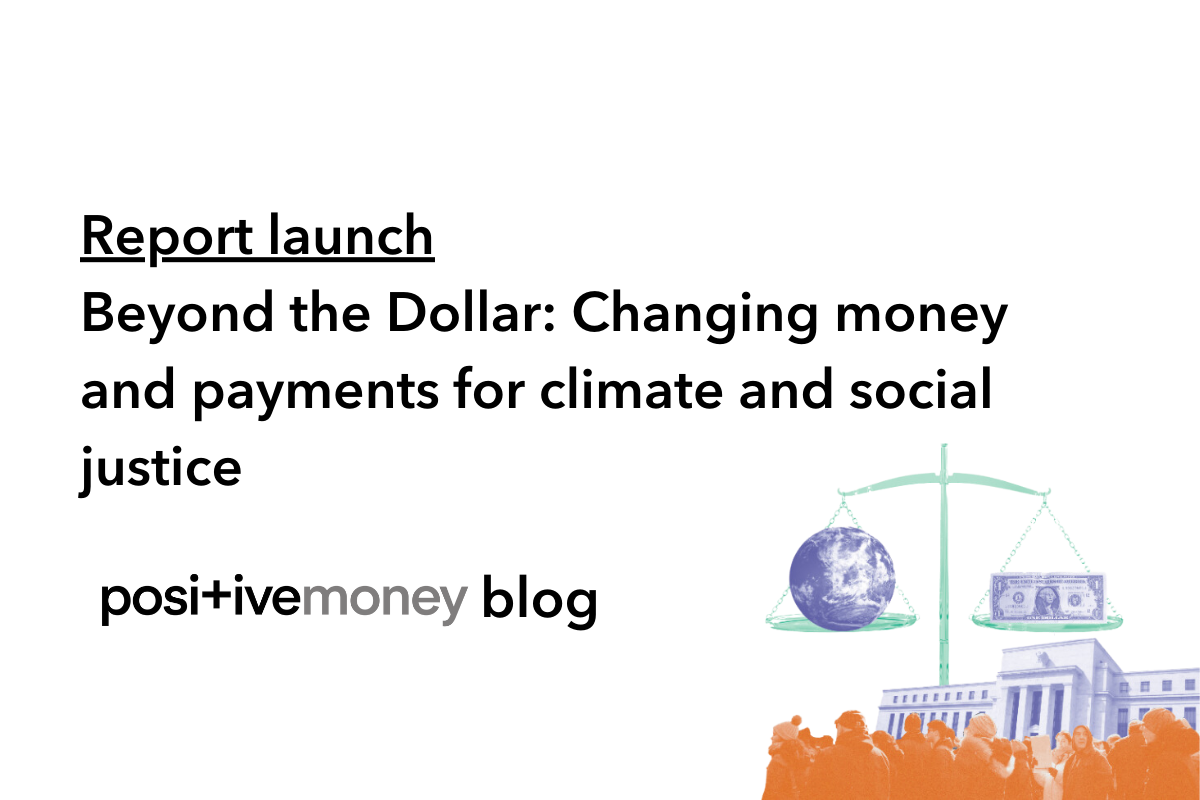
UKGlobal
27 January 2026
We launched our latest report, ‘Beyond Dollar Dominance: New money and payment systems for a multipolar world’, with a webinar featuring key experts to explore the tensions and opportunities to reform the International Monetary and Financial System (IMFS).
To mark the publication of our new report, ‘Beyond Dollar Dominance’, we hosted a webinar with a panel of expert academics, former central bankers and policymakers, and its lead author on 11th December 2024. Watch the event recording below.
Countries in the Global South are continually disadvantaged by an International Monetary and Financial System (IMFS) that is unjust and rigged against them. The US dollar reigns supreme in the IMFS, leaving Global South countries forced to exploit their natural resources to obtain dollars for trade and debt repayments. This leaves them with very little to invest in public services or climate adaptation.
But it doesn’t have to be like this. Bottom-up approaches to increase the use of local currencies, Central Bank Digital Currencies (CBDCs), and new payment systems are just some of the many ways Global South countries can reclaim monetary policy space in the face of this currency hierarchy. It is this unfair global order, and the ways in which it could be rebalanced, that are the key subjects of our latest report.
Our launch webinar featured an incredible panel of experts: Dr Ndongo Samba Sylla (International Development Economics Associates); Dr Devika Dutt (King's College, London); Dr Andrés Arauz (Center for Economic and Policy Research); Jerome Phelps (Debt Justice); and report lead author, Danisha Kazi (Positive Money). The event was chaired by our outgoing Co-Executive Director Fran Boait.
Danisha began with an overview of the report, its key policy implications and an acknowledgement of its timeliness, with the failure of COP29 to deliver urgently needed climate finance to Global South countries, and the potential implications of a Trump presidency for the IMFS. She also stressed that countries lower down in the currency hierarchy have already been working to reduce their dependency on the dollar and the dollar-centric IMFS by successfully implementing bottom-up solutions, as highlighted in the report.
Ndongo reminded us of the need to challenge not just the dollar, but also other hegemonic or colonial currencies, such as the CFA Franc. He also emphasised the differences between countries with a deficit and surplus in their balance of payments, and how the interests of the BRICS often don’t align with other, deficit countries in the Global South. A truly equitable system is not one that simply allows surplus countries to hoard a different currency to the dollar, but one that eliminates the need to accumulate foreign exchange and facilitates trade in local currencies. He finally cautioned against single currency unions between countries, such as those which have been proposed for Africa, as too politically demanding in the current context. Instead, our focus should be on building domestic financial systems that are genuinely under national control.
Devika added further context to why the current system has such a devastating impact on countries lower in the currency hierarchy by explaining the mechanisms of the global financial safety net. Access to central bank swap arrangements, the most effective of safety nets, is deeply political, and the Federal Reserve uses these to further US foreign policy interests. She described payment systems as “where the rubber meets the road” of imposing US interests outside of moments of crisis too, likening the IMFS to a network of plumbing where the US is able to turn the tap on and off. She therefore argued any genuine challenge to the current IMFS means challenging US hegemony head-on, something that countries are often extremely hesitant to do.
Andrés highlighted the importance of framing these debates in terms of hierarchies, and the unequal power relations in the IMFS that can go unnamed in other publications. He also emphasised the hierarchy in the correspondence banking system - namely private finance companies and megabanks, such as JP Morgan, HSBC, and Barclays. They hold huge influence over Global South countries’ access to finance, and possess enormous lobbying power. New approaches to money and payments like CBDCs, the Ecuadorian version of which Andrés was part of setting up, are a threat to their monopoly power.
Jerome highlighted the on-going debt crises facing many Global South countries and how this further exacerbates the disadvantages of being lower in the currency hierarchy, citing how 32 African countries spend more on debt than healthcare, and how debt payments have increased by over 200% between 2010-24. One of the key factors behind this increase is US interest rate hikes - an example of just how much ripple effects from US monetary policy changes can be felt globally, as Global South countries are often forced by the dollar-centric IMFS to borrow in dollars.
After the panel’s initial contributions, there were a variety of questions posed by chair Fran Boait and our audience. On CBDCs and their potential, our panel was in agreement that the obstacles to them are not technological but political - without political commitment they simply can’t happen. Danisha added that CBDCs offer a public alternative to build wider acceptance of local currencies where private finance is resistant, and offer an additional tool in the toolbox to reduce dollar dependency.
Other questions concerned the extent to which average US citizens benefit from the dollar’s dominance, with the panel highlighting that the hierarchical IMFS primarily serves the interests of elites in various countries, even if some benefits may trickle down, albeit unevenly, to ordinary US workers. On the BRICS and the impact of a potential new currency, panellists expressed how more multipolarity in the global economy is a good thing, but not a panacea. In particular, the benefits of a BRICS-based currency or payment system would be limited for export-deficit countries, and it would have very little impact on the global debt crisis. In the current political context and threats of tariffs and sanctions, Danisha summed up the importance of Global South countries building collective regional power to protect themselves against Global North countries, who will always try to maintain the status quo that benefits them.
Our panellists concluded by re-emphasising how important politics is in determining the feasibility of the kind of solutions discussed in the report. In the current fragmented and volatile geopolitical landscape, a focus on South-based payment systems and novel South-South financing initiatives will be extremely important to reduce dollar dependency and mitigate against the risks of the current IMFS.
Find the 'Beyond Dollar Dominance' report on our website here, and view the press release here.
